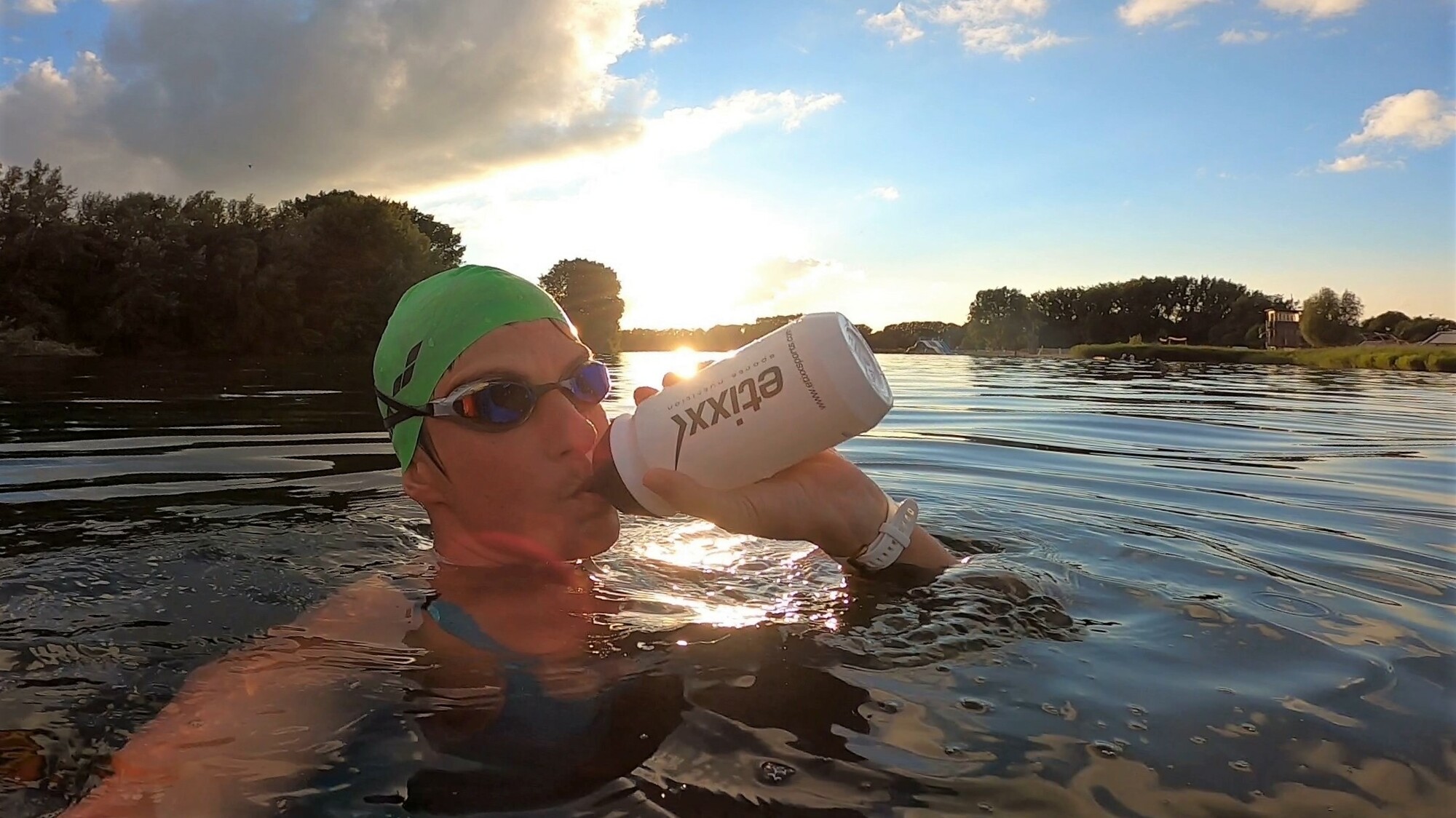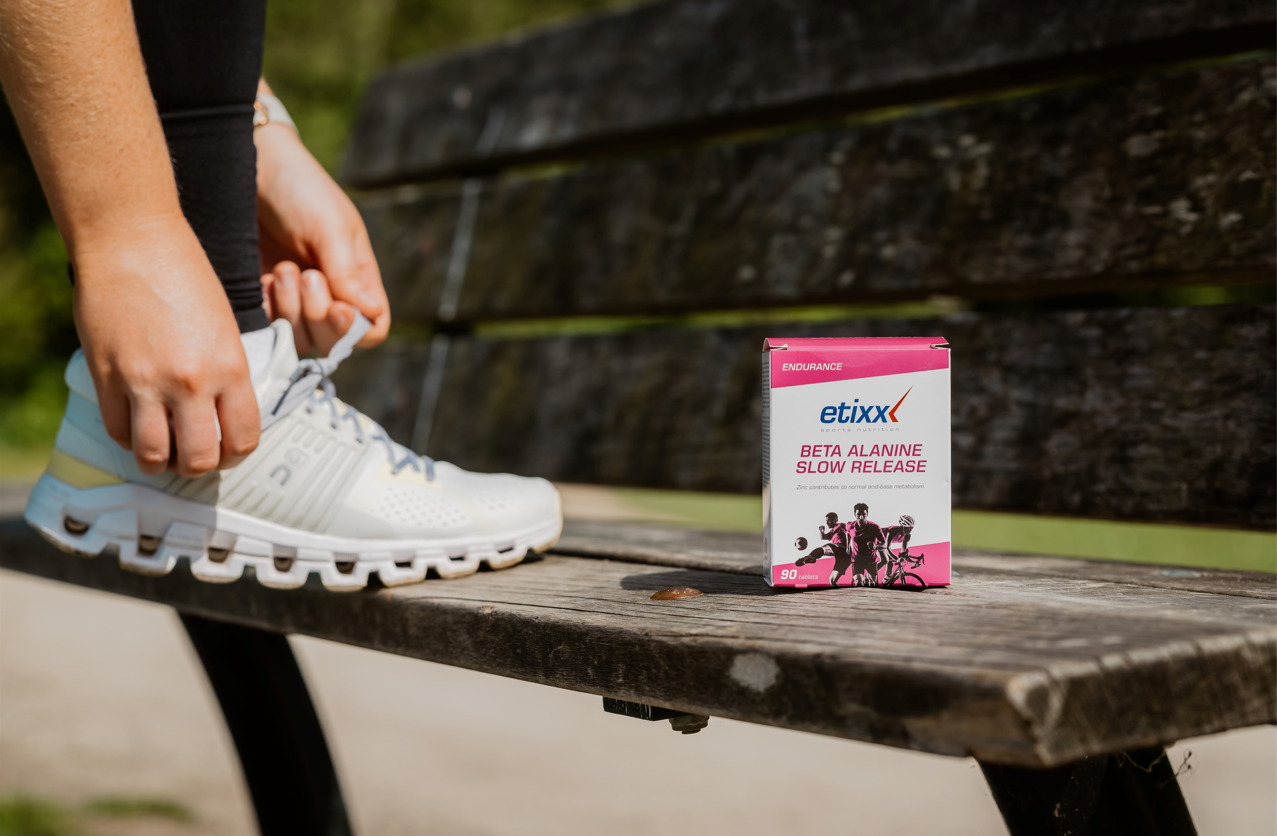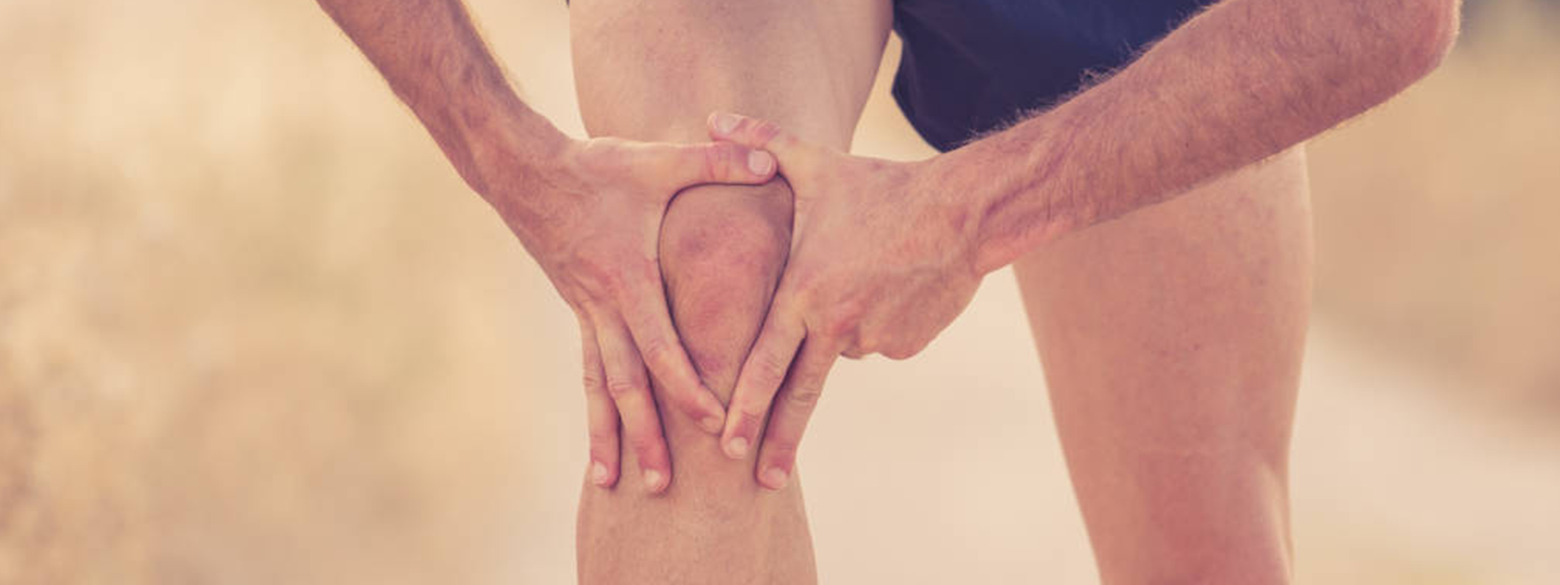3 tips for perfect winter preparation!
Friday 22 October 2021

On 19 August 2021, Marieke Blomme managed to become the first woman ever to swim down the Belgian coastline (67km). She did so in 18 hours and 45 minutes. That is almost 5 hours faster than the previous record, which was held by Matthieu Bonne. To complete this extreme challenge, Marieke chose Etixx as her sports nutrition partner in the preparation and during the record attempt. The Etixx Isotonic and the Double Carb Energy Gel PRO LINE were her allies during the many lonely hours in the sea. In the article below, Marieke shares her 3 ultimate tips for perfect winter preparation.
TIP 1: Build out an ample base
During the winter period, take the time to build your base towards a smashing summer.
A gradual build-up of slow and systematically longer endurance training in winter provides an indispensable basis towards a successful race season. If you start planning the longest training sessions too close to an event, leaving no room for building up experience, adjusting technique, etc., you will not give your body enough time to adjust to the required volume. If intensity and volume are built out together over a short period of time, you create the ideal cocktail for injury.
In the winter months, it can also be great fun to couple a week's holiday with a training week. Training under the sun, getting a dose of vitamin D, getting extra hours of sleep and rest, being able to enjoy good food without any guilt.... More than 2 birds with one stone! However, don't get caught in group training: cycle, run or swim your own pace and stick to your own heart rate zones for longer endurance workouts. It's wise not to bring slightly more intense work and specific race preparations to the fore until after the winter months. It is important not to do this throughout the winter, so as not to shoot all your arrows before the season starts.
At the end of the winter and build-up period, a small competition stimulus is the ideal way to test whether you are already on the right track and what your possible work points are. Evaluate well and adjust your training. That way it stays fun and you gain a lot of experience along the way!
"I personally, have set all my sights on 1 competition last year, there was also no other option due to lack of time (the high training volume left little time for additional travel and competition organisation) and the cancellation of competitions due to covid measures, but I could immediately also experience first-hand how much stress this entails. Selecting only 1 A race and training only for that is therefore for me personally an exception and not recommended. You put all your money on 1 competition, and everything depends on its success. This creates enormous stress for yourself and consequently also for the people around you. But sometimes there is no other way... just think carefully if you choose to do this. In most cases, you can plan a few shorter races leading up to, and then the season is not lost either if your most important race is cancelled, disappointing, or if you fall ill unexpectedly... we simply don't have everything under control, so try to avoid disappointment and give yourself the chance to build up experience.
Further in terms of basic building for me: I have been building on existing swim training for 20 years now and still learn every year! Every winter I try to hone technique and learn something more! Building out in volume this time was obviously a slightly bigger undertaking than all previous years. Until recently, my longest race ever was the BK 10km open water."
TIP 2: Test nutrition and hydration during long winter training sessions!
To achieve the best possible results at competitions, training is sometimes long and hard. This is the ideal opportunity to also test nutrition and hydration options to use during competitions. To be well prepared at the start of a competition, it is very important to test your nutrition and drink in different conditions. You want to know which nutrition goes in well in extremely hot weather, and which nutrition works better in cold weather, which combinations are optimal, what can still provide a solution in an emergency, and so on. So give yourself the opportunity to test out a wide range of sports nutrition.
In doing so, don't test a gel once at a training session just to assume it will be your competition food. Test different types and flavours in different weather conditions. For example, try to ingest something during an intense run. You will find that it not only requires more dexterity, but it also tells you what your stomach thinks about still eating/drinking on command during intense efforts. Also test different things in combination. Don't just assume that the isotonic drink of your choice will go with your preferred gels.
Long workouts during the winter months are ideal to experiment with this. On the one hand, during these training sessions, good nutrition and hydration are very important for the quality of the training. On the other hand, it is nice to enter the race season with some experience and a basic range of nutrition that you tolerate well.
"Ahead of swimming the Belgian coastline, I tested untold types of sports nutrition, first separately and then in combination in the pool during long training sessions.... Once the water temperature outside became slightly more pleasant, all the approved products were tested outside.... There was a lot of tinkering with the nutrition plan during these final months. A lot of products that were perfect during the long training sessions in the pool turned out to be unsuitable for a competition in the sea, for example, or too clumsy for quick play indoors. And new combinations were tested: gingerbread with a gel through it, banana with energy gel in a porridge, hot liquid food, tea with isotonic drink.... You name it! Everything combined with a sip of seawater and in combination. It added an extra dimension to preparing for a race and also made me think again how important testing nutrition/hydration is and how quickly things can go wrong if you eat something wrong/too much or too little."
TIP 3: Recovery is key
Rest is the most important part of your training. From macro to micro cycle, as well as after each workout: rest is important to get optimal effect from training.
After your most important race of the year (or after a longer competition period), give yourself a few weeks or more of rest. Allow yourself mental and physical rest and also leave the training schedule for a while. This does not mean not doing anything, but set aside structured training and make more room for other sports or workouts than you are used to. Enjoy the variety and freedom!
It can be confusing to kick off a schedule like this for a while. But rest assured that afterwards you will be extra motivated at the start of your winter preparation! This is also the ideal time to think about next year. You can evaluate the past year and plan the coming season. Of course, you don't have to choose your goal during this period, but it creates opportunities. For example, you can decide to do a your first full triathlon in August next year, but still leave the final race date open.
During these relatively quiet training sessions, don't stare blindly at numbers like CTL and wattages. There is also no need to panic if you skip some workouts due to illness or fatigue. Listen to your body. Provide a recovery shake after long training sessions, especially in winter, and give yourself the necessary rest.
Anyway, these are wise lessons throughout the year: sleep is essential to get results from training. Only in this way will you become stronger and be able to adapt to the training load imposed. Try to pay extra attention to this during winter preparation. The days are shorter, we are more likely to catch a cold. A well-developed training schedule also provides mental peace, structure and overview... not unimportant in our busy lives.
"In preparation for the Belgian Coast Swim, I also called on a coach myself to draw up a training plan and build up training sessions. This provides (also as a coach) new insights, someone is watching from a distance with a fresh perspective and more overview. It is also a lot easier to just execute training sessions, instead of imposing everything on yourself. The idea that someone is looking over your shoulder is in itself an extra motivation too!
7days before the Belgian Coast Swim I was given another bad, summer cold, luckily no covid, I had planned some more loose swimming, also some final tests in terms of equipment and nutrition but of course this was all cancelled. It became a week of sleeping, resting, extra vitamin C.. Then when you've already done all the work it doesn't matter any more, the preparatory plan was already done, the last weeks were taper, extra (mental) preparation! I started this undertaking with the lowest CTL/the lowest fitness ever. But I was rested and mentally and physically ready to go and very happy to finally start this adventure! And for me this also remains for now the strongest performance so far in my sports career, the best preparation compared to other races I did so far. But thus, according to the charts, the worst fitness ever. Never get caught by numbers and graphs! Everyone is different, self-knowledge is very important as an endurance athlete!"



